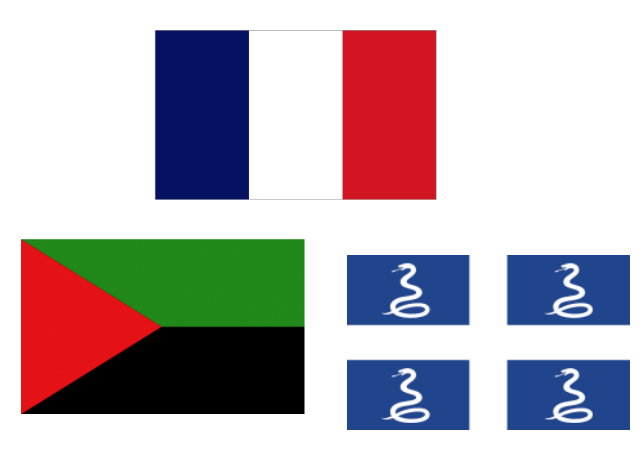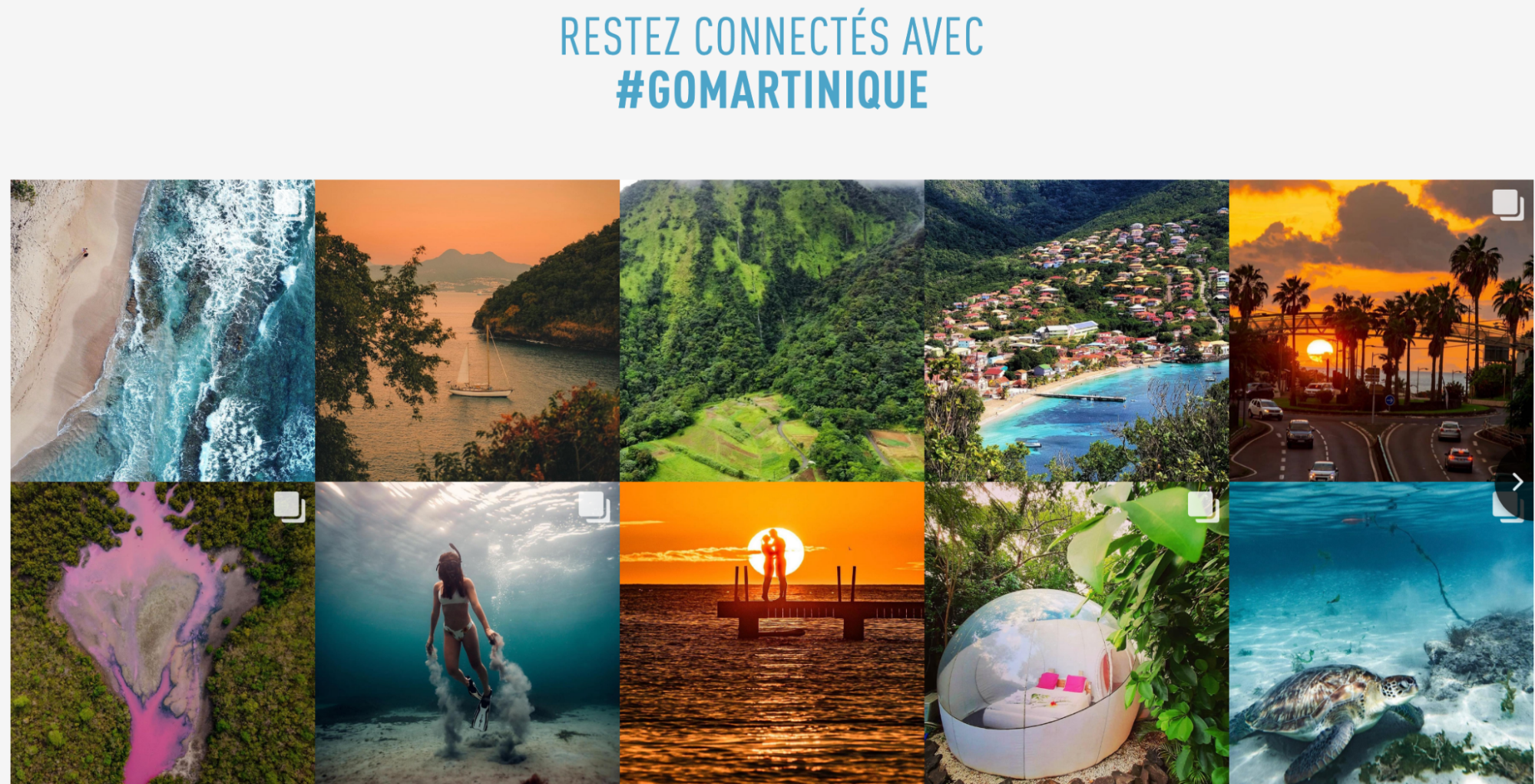3 CH 3 #ModeVacances
Les objectifs du chapitre
In this chapter, you will:
- talk about geography
- count up to 100 000 000
- navigate traveling websites and book a trip online
- talk about the weather
- discuss which season you prefer and why
- learn and use Arabic words commonly used in French
- learn and use the verb to do /faire
- talk about where you like to go and what you like to do on vacation
- tell someone what types of activities one can enjoy in different types of weather
- learn and use -IR verbs
- learn and use various ways to negate sentences (ne…jamais, ne…plus, …)
- learn about French school holidays and breaks
- tell someone about your favorite pastimes and activities
- learn and use the verb to go /aller
- learn and use prepositions with places
- learn about paid leave in the Francophone world
- tell someone what types of activities one can enjoy in various places
- express provenance from a particular destination
- tell someone what you generally do on the week-ends
- learn and use how to speak about the future / le futur proche
- tell someone what you are going to do next week-end
- talk about Antillean Creole, Martinique, and Aimé Césaire
At the end of the chapter you will revisit this list to self-assess your learning.
 ♦
♦
Week 8 Day 1
La géographie et la météo
 ♦
♦
1. On se familiarise avec le vocabulaire
Le vocabulaire utile : La géographie
To see useful vocabulary and activities for Chapter 3, go to: Ch 3 On se familiarise avec le vocabulaire
Practice
Qu’est-ce que c’est ? C’est / Ce sont…
Do you remember how to say big numbers in French? Let’s do a quick review.
Le vocabulaire utile : les nombres à réviser
D’abord révisez les nombres de 21 à 1000.
Les nombres |
||
|
1000 mille |
10 000 dix mille |
100 000 cent mille |
|
1001 mille un |
20 000 vingt mille |
200 001 deux cent mille un |
|
1274 mille deux cent soixante-quatorze/ mille deux cent septante-quatre |
52 789 cinquante-deux mille sept cent quatre vingt-neuf/ cinquante-deux mille sept cent huitante-neuf |
335 785 trois cent trente-cinq mille sept cent quatre-vingt-cinq / trois cent trente-cinq mille sept cent huitante-cinq |
|
1869 mille huit cent soixante-neuf |
89 104 quatre-vingt-neuf mille cent quatre/ huitante-neuf mille cent quatre |
1 000 000 un million |
|
2000 deux mille |
94 555 quatre-vingt-quatorze mille cinq cent cinquante-cinq/ nonante-quatre mille cinq cent cinquante-cinq |
1 000 000 000 un milliard |
In most languages, people rarely have to spell out numbers. Think about it, when was the last time you had to do it? French is no different and in the rare instances French speakers have to, they struggle as the spelling rules for numbers are very complex.
Practice
Écoutez les informations lues (=read) par votre prof et écrivez les chiffres que vous entendez en utilisant des numéros.
Important: Don’t forget to put a space between the digits to separate groups of three digits, starting from the right — but only for thousands and above. See the model sentence below.
|
Modèle : Le plus grand état des États-Unis est l’Alaska, 1 723 337 km². |
Les pays francophones et leurs habitants


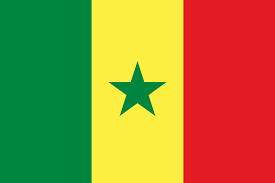
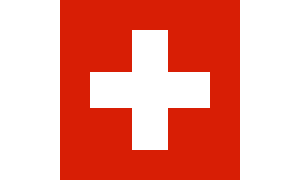
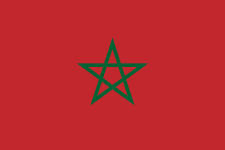
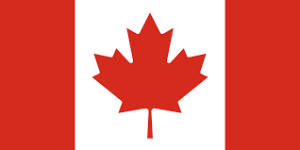
Le professeur lit (=reads) le nombre d’habitants dans quelques pays francophones. Écrivez les nombres ! N’oubliez pas l’espace pour séparer les chiffres dans les grands nombres.
Il est temps de faire des recherches sur Internet et de trouver les chiffres pour ton/ votre pays et ta/ votre ville !
Combien d’habitants est-ce qu’il y a dans ton/ votre pays ? Dans mon pays, il y a … habitants
Combien d’habitants est-ce qu’il y a dans ta/ votre ville ? Dans ma ville, il y a … habitants.
2. Le Carnet personnel : Voyage en avion
🗺️Exploration
Step 1. Visit the following website, choose a destination and write down your flight information.
Vols pas chers : Comparateur de vols et billets d’avion | KAYAK
Step 2. Your friend has offered to pick you up at the airport when you return. Tell them your flight information (departure city, departure and arrival dates, arrival time and flight number) so they can write it down, then compare your details to make sure they are correct.
Modèle :
Personne #1: Où est-ce que tu voyages ?
Personne #2: À Dakar.
Personne #1: Quel jour ?
Personne #2: Du lundi 15 octobre jusqu’au 28 octobre.
Personne #1: À quelle heure est ton vol de retour (=return flight) ?
Personne #2: À 14h39.
Personne #1: Quel est le numéro de ton vol ?
Personne #2: C’ est le vol AF 0798.
Personne #1: Super ! Bon voyage.
🧳 Activité : Réservez un voyage en ligne !
Objectif : Apprendre à utiliser un site de voyage francophone pour réserver un vol, un hôtel, et explorer des activités.
- Choisissez une destination francophone (par exemple : Paris, Montréal, Dakar, Genève).
- Allez sur un site de voyage en français (comme https://www.expedia.fr, https://www.airfrance.fr, ou https://www.booking.com en version française).
- Trouvez :
- Un vol aller-retour
- Un hôtel pour 3 nuits
- Une activité touristique (musée, visite guidée, etc.)
- Prenez des captures d’écran ou notez :
- Les dates du voyage
- Le prix total
- Le nom de l’hôtel et de l’activité
- Les horaires du vol
- Remplissez ce petit formulaire en français :
-
- Ma destination :
- Dates du voyage :
- Compagnie aérienne :
- Horaires du vol :
- Nom de l’hôtel :
- Prix total :
- Activités touristiques :
3. On découvre : la météo
Le vocabulaire utile : le temps et les saisons
Practice
La météo en contexte. Activez les sous-titres en français ou en anglais.
Notez toutes les expressions que vous entendez. Vérifiez votre compréhension de la vidéo :
C’est bizarre ou c’est normal ? Lisez les phrases, est-ce que c’est bizarre ou c’est normal ?
A vous ! Avec un.e partenaire ou en solo, écrivez deux phrases bizarres et deux phrases normales sur le temps qu’il fait dans votre région. Partagez vos phrases avec le reste de la classe. C’est bizarre ou c’est normal ?
🌦️ Activité : Trouvez l’intru !
Pour chaque activité, trouvez l’intru (=Find the odd one out) — la condition météo qui ne correspond pas à l’activité en général.
4. Le Carnet personnel: Vos activités et la météo préférée
Dans votre Carnet personnel, choisissez 5 activités de la liste ci-dessous. Pour chaque activité, écrivez une phrase pour dire quelle météo vous préférez quand vous la faites [=when you do it].
| Les activités | La météo |
|
|
Modèle :
Je préfère rester à la maison quand il fait froid et quand il pleut. Je préfère faire des randonnées quand il fait beau et qu’il y a un peu de vent.
5. La météo en images : les emojis
 Emojis are visual symbols we use to show feelings, ideas, or things—like 😊 for happiness or 🌧️ for rain. They’re very popular because they work in almost any language! Even though the emoji itself does not change, people in different places might use it in slightly different ways. In French, emojis are used a lot in texts, social media, and casual conversations. They help add emotion or make your message more fun. For example, you might say “Il fait beau aujourd’hui ☀️” to show it’s a sunny and happy day. Emojis are also great for learning French because they help you connect words with images—especially when talking about weather, feelings, or activities.
Emojis are visual symbols we use to show feelings, ideas, or things—like 😊 for happiness or 🌧️ for rain. They’re very popular because they work in almost any language! Even though the emoji itself does not change, people in different places might use it in slightly different ways. In French, emojis are used a lot in texts, social media, and casual conversations. They help add emotion or make your message more fun. For example, you might say “Il fait beau aujourd’hui ☀️” to show it’s a sunny and happy day. Emojis are also great for learning French because they help you connect words with images—especially when talking about weather, feelings, or activities.
Practice
Quel emoji associez-vous aux différentes conditions météo ?
☔🌨🌞🌦⛅🌤🌬🍃🧊🥶🔥🌪⛈
Quel temps/ emoji associez-vous avec ces villes?
![]() ♦
♦![]()
Week 8 Day 2
Les saisons et les activités
 ♦
♦
1. Parler du beau temps
The French expression “parler du beau temps” literally means “to talk about the nice weather.” But culturally, it’s often used to describe small talk or light conversation—especially when people want to avoid serious topics or just be polite. It’s similar to saying “talking about the weather” in English, which is a common way to start a conversation or fill silence. In French, this phrase can also carry a subtle meaning of avoiding deeper issues or keeping things neutral. The expression “parler du beau temps” is actually a shortened version of the fuller phrase “parler de la pluie et du beau temps.” This longer expression means “to talk about the rain and the nice weather,” and it’s used to describe small talk and often means to sepak about everything and nothing, without going too deep into any subject. The shorter version, “parler du beau temps,” focuses just on the pleasant side of that idea, but both expressions carry the same sentiment: talking about the weather as a safe, neutral subject.
Talking about the weather is one of the easiest and safest ways to start a conversation—because it’s always changing and everyone experiences it! In French, knowing how to talk about seasons and weather helps you connect with others, whether you’re chatting casually or working in customer service, tourism, or international business. It’s also culturally meaningful: in many places, people use weather talk to be polite, break the ice, or show interest.
French even has beautiful expressions that use weather to convey deeper meanings. One popular saying is “Après la pluie, le beau temps”, which literally means “After the rain, good weather”—and figuratively, “After hard times, better days will come.” It’s a reminder that just like the weather, life’s challenges pass, and brighter moments follow. So learning these expressions isn’t just useful—it’s part of being ready for real-world conversations and understanding the culture behind the language.
Here are some emojis that match each French season:
- L’été (Summer) ☀️🍉🔥
- L’automne (Autumn/Fall) 🍂🍁🎃
- L’hiver (Winter) ❄️⛄️🌨️
- Le printemps (Spring) 🌸🌷🌦️
One of the most common questions you’ll encounter in small talk or when beginning to learn a new language is: “What is your favorite season, and why?”
This question offers a great opportunity to share personal insights and experiences in a safe, nonjudgmental way. It encourages connection and comparison without pressure, making it ideal for language learners and casual conversations alike. Here is a short video that captures some of the conversations around this very question.
Quelle est votre saison préférée et pourquoi ? Quel temps fait-il où vous êtes ?
Regardez cette vidéo où plusieurs personnes partagent leur saison préférée et expliquent pourquoi elles aiment l’été ☀️, l’automne 🍁, le printemps🌷 ou même l’hiver ⛄️. Elles évoquent aussi leurs meilleurs souvenirs liés à cette saison, comme des vacances, des retrouvailles avec la famille ou les amis ou des moments d’enfance. Enfin, les gens parlent de la saison qu’ils aiment le moins, souvent l’hiver ❄️à cause du froid et du manque de soleil, ou l’été 🔥 à cause de la chaleur excessive.
“Bah du coup” – Did you here this expression in the video?
“Bah du coup” est typique du français oral ! Il ne faut pas trop le traduire mot à mot, mais plutôt comprendre qu’il sert à relier les idées de façon naturelle.
- “Bah” est une interjection très courante en français parlé. Elle sert à marquer une hésitation, à introduire une réponse ou à adoucir le ton.
- “Du coup” signifie littéralement “as a result” ou “so”, mais en français familier, on l’utilise souvent pour enchaîner les idées ou introduire une conséquence.
- Exemple : Bah du coup, j’ai choisi l’été parce qu’il fait beau. (So, I chose summer because the weather is nice.)
🤷L’une des personnes interviewées a dit: “Il n’y a pas de saison où on se sent pas bien ; quand on est bien dans sa tête, on est bien à toutes les saisons.” [There’s no season where you feel bad; when you feel good in your mind, you feel good in every season.] Cette phrase est philosophique et positive. Elle veut dire que le bien-être mental est plus important que la météo ou la saison. Si on est heureux et équilibré, toutes les saisons peuvent être agréables. Êtes-vous d’accord ? [Do you agree?]
2. Le Carnet personnel : Vous et le temps 
Activité 1 : Ma saison préférée
Consigne : Réponds à la question posée dans la vidéo : Quelle est ta saison préférée et pourquoi ?
Exemple : Ma saison préférée est l’automne parce que j’aime les couleurs des feuilles et l’air frais.
Activité 2 : Le temps selon les saisons
Consigne : Complète les phrases en décrivant le temps qu’il fait dans ta ville ou une ville que tu connais bien, selon chaque saison.
Modèle :
- En été à Fort-de-France, il pleut beaucoup.
- En automne à Fort-de-France, il fait bon.
- En hiver à Fort-de-France, il fait chaud et il ne pleut pas.
- Au printemps à Fort-de-France, le temps est ensoleillé et peu pluvieux.
À toi !
- En été à [ville], __________________________________________
- En automne à [ville], ______________________________________
- En hiver à [ville], _________________________________________
- Au printemps à [ville], _____________________________________
3. On lit
♦♦ Variations sociales : Borrowings from Arabic
Like all human languages, French has a rich set of vocabulary containing many words and expressions that originated in other languages and cultures. This is because languages are always in contact with one another, across geopolitical boundaries, in virtual spaces, and in the minds and mouths of the multilinguals who use them. Many borrowings come from the sharing of cultural practices and technological advances in a globalized world. Arabic is the third largest source of borrowings in French after English and Italian.
Most of the borrowings in French from Arabic are in the domains of medicine, alchemy, mathematics or commerce. Does your first language also contain any of these words? Most entered one or more Romance languages (=languages descended from Latin) before entering English:
Médecine : élixir, camphre, momie, nuque, sucre
Alchimie : alambic, calibre, azur, sirop
Mathématiques : algèbre, chiffre (=cipher, number), hasard, zéro
Commerce : douane (=customs), coton, magasin, orange, avarie (=damage), jupe, amiral, arsenal, goudron, gazelle, matelas, raquette
France’s colonial presence in arabophone countries in North Africa (in particular, Morocco, Tunisia, Algeria) in the 19th and 20th centuries, has also led to a more recent generation of Arabic-inspired borrowings into French, many relating to warfare and occupation:
le baroud (=combat), le bled (=an uninteresting small town), le clebs (=a dog), le ramdam (=hullabaloo), un béni-oui-oui (=a yes man), le flouze (=money), la nouba (=party), le toubib (=a doctor)
A few 21st-century borrowings from Arabic have been popularized by youth in the rap scene, including kiffer (=to like), avoir le seum (=to be raving mad), wesh (=what’s up?).
In your language do you know any Arabic words that are commonly used?
Read Arabic loanwords: 50+ French words like café borrowed from Arabic.Here are some Arabic words below with their French & English equivalents.
| un artichaut (artichoke) |
الخرشوفة (al-hursufa) or (al-ḵaršūfa) |
| un abricot (apricot) |
البرقوق (al-barqūq) |
| le coton (cotton) |
قطن (qatn) |
| une pastèque (watermelon) |
بطيخ (baṭīkh) |
| une guitare (guitar) |
ثارة (qīthārah) |
| un magasin (store, warehouse) |
مخزن (makhzan) |
Some present-day words in French come from compound forms in Arabic (i.e. combinations of separate words into a single word) that give a rough description of the concept they represent, e.g. ‘hippo-potamus’ comes from a combination of the words potamus ‘river’ and hippo ‘horse’ because a hippopotamus is a horse-like animal that lives in rivers. The words below are all French compound forms originally made up of Arabic words. Consider the present-day meaning of each compound form and try to match it up with the literal meaning of its parts. Refer to the above article if you need a hint.
| massepain, m. (marzipan) | ‘spice-box’ – sweet, exotic, often spiced treat |
| cafard, m. (cockroach) | ‘infidel/unbeliever’ – metaphorically used in colonial contexts |
| jardin, m. (garden) | ‘paradise’ – symbolic of Eden or a peaceful place |
| algèbre, f. (algebra) | ‘the reunion of broken parts’ – from Arabic al-jabr |
| échec, m.(chess) | ‘the king is dead’ – from checkmate, derived from Persian shāh māt |
| élixir, m. (elixir) | ‘the philosopher’s stone’ – magical or alchemical solution |
To read more about Arabic borrowings in French, check out:
4. On découvre : le verbe faire
French, like many languages, has evolved through cultural exchange. You’ve just seen how words like algèbre, massepain, and élixir come from Arabic—showing how languages borrow and adapt ideas from one another.
About 75–80% of French vocabulary comes from Latin, since French is a Romance language that evolved from spoken Latin used during the Roman Empire. However, French has also borrowed words from many other languages over time, such as Greek (e.g., philosophie, théâtre), Italian (e.g., opéra, piano), English (e.g., weekend, parking), and Germanic languages (e.g., guerre, gagner). These influences reflect France’s rich history of cultural exchange and make the language both diverse and dynamic.
The verb faire comes from Latin facere, meaning to do or to make. It’s one of the most versatile and frequently used verbs in French, appearing in countless expressions—from talking about the weather (il fait beau) to describing actions (faire du sport, faire la cuisine, faire attention). Just like borrowed words enrich vocabulary, faire enriches expression—helping speakers describe what they do, feel, and experience.
Practice
Read these six examples of the usage of faire and observe how it changes its meaning based on the context. Then, match each one with its correct English translation.
What do you notice about the verb faire? Does it always mean the same thing? You’re right—its meaning varies greatly depending on the context. Sometimes it means to do, sometimes to make, and often it’s part of expressions that don’t translate word-for-word. To learn more about this verb, go to #Grammaire #FAIRE Lisez les explications et complétez les activités : faire ‘to do, to make’ and #Grammaire #ExpressionsAvecFaire Lisez les explications et complétez les activités : faire expressions
In your Carnet personnel
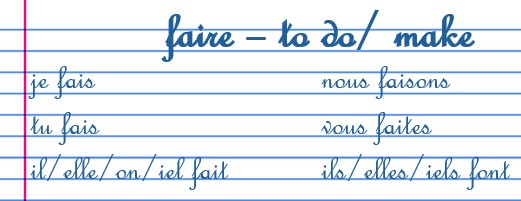
Practice
Écoutez la conjugaison du verbe faire au présent :
Complétez avec la forme correcte du verbe faire.
On fait quoi où ? Quelles activités vont avec chaque endroit ?
A vous ! Prononcez la conjugaison du verbe faire au présent :
4. Le Carnet personnel : Vos activités et le temps
🛋️🍿🚴♀️Que fais-tu le week-end ?
Lis les questions ci-dessous et écris un paragraphe pour parler de tes activités du week-end. Utilise le verbe faire (et d’autres verbes si nécessaire) en le conjuguant correctement. N’oublie pas d’utiliser les adverbes que tu as appris dans le Chapitre 2 pour indiquer la fréquence — c’est-à-dire à quelle fréquence tu fais ces activités – souvent, rarement, toujours, jamais, parfois, etc.
- Est-ce que tu voyages le week-end ?
- Est-ce que tu fais des randonnées à la montagne ?
- Est-ce que tu fais souvent tes devoirs le dimanche ?
- Est-ce que tu fais du jogging le week-end ?
- Est-ce que tu fais une promenade tous les samedis ?
- Est-ce que tu vas souvent au café ?
- Est-ce que tu fais du sport ?
- Est-ce que tu fais beaucoup de shopping ?
📝 Modèle de réponse :
Je ne voyage pas le week-end, mais je fais souvent des promenades.
Je fais toujours mes devoirs le dimanche et je vais souvent au café pour étudier.
Je ne fais pas beaucoup de shopping parce que je suis étudiant.e et je n’ai pas beaucoup d’argent.
💭 Et ta classe ?
Fais une supposition sur les habitudes de ta classe. Écris une phrase pour chaque question :
- Quelle est l’activité la plus (+) populaire de la classe ?
Je pense que l’activité la plus populaire, c’est…
- Quelle est l’activité la moins (-) populaire de la classe ?
À mon avis, l’activité la moins populaire, c’est…
🌞🥶☔🔥Qu’est-ce que tu aimes faire quand …?
Écris ce que tu aimes faire quand il fait différents types de temps. Donne au moins deux activités pour chaque type de météo afin de rendre tes réponses plus détaillées et pour pratiquer le vocabulaire que tu viens d’apprendre.
- Quand il fait beau, j’aime …
- Quand il fait froid, j’aime …
- Quand il pleut, j’aime …
- Quand il fait chaud, j’aime …
📝 Modèle de réponse :
🌞 Quand il fait beau, j’aime faire du vélo et aller au parc avec mes amis.
☔ Quand il pleut, je reste à la maison et je regarde des séries.
5. On explore la météo en Afrique
Quel temps fait-il en Afrique aujourd’hui ? Consultez Météo Afrique : Prévisions METEO GRATUITE à 15 jours – La Chaîne Météo
Explorez le site ci-dessus. Cliquez sur ‘les villes principales’ et sélectionnez les pays et villes du tableau et notez quel temps il fait pour compléter le tableau dans votre Carnet personnel
|
Quel temps fait-il aujourd’hui… |
|
|
à Alger (en Algérie) |
Il fait … / Il y a … |
|
à Cotonou (au Bénin) |
Il fait … / Il y a … |
|
à Yamoussoukro (en Côte d’Ivoire) |
Il fait … / Il y a … |
|
à Tunis (en Tunisie) |
Il fait … / Il y a … |
 ♦
♦
Week 8 Day 3
On part en vacances où ?
 ♦
♦
1. On analyse : les verbes irréguliers en -IR et les activités quotidiennes
Now that we’ve explored how seasons shape our experiences, let’s shift to something even more personal—our daily routines. To describe everyday activities like sleeping, moving around, or going out, we rely on a few essential verbs. Let’s take a look at three of them that are especially useful.
Lisez les phrases suivantes et choisissez la réponse appropriée – typique ou pas typique – selon (=according) vous.
|
Mes activités |
typique(s) |
pas typique(s) |
|
⬜ | ⬜ |
|
⬜ | ⬜ |
|
⬜ | ⬜ |
|
⬜ | ⬜ |
|
⬜ | ⬜ |
|
⬜ | ⬜ |
To learn more about these three verbs – partir, sortir, and dormir, go to #Grammaire #-IRverbs. Lisez les explications et complétez les activités : -ir verbs (irregular) partir, sortir, and dormir
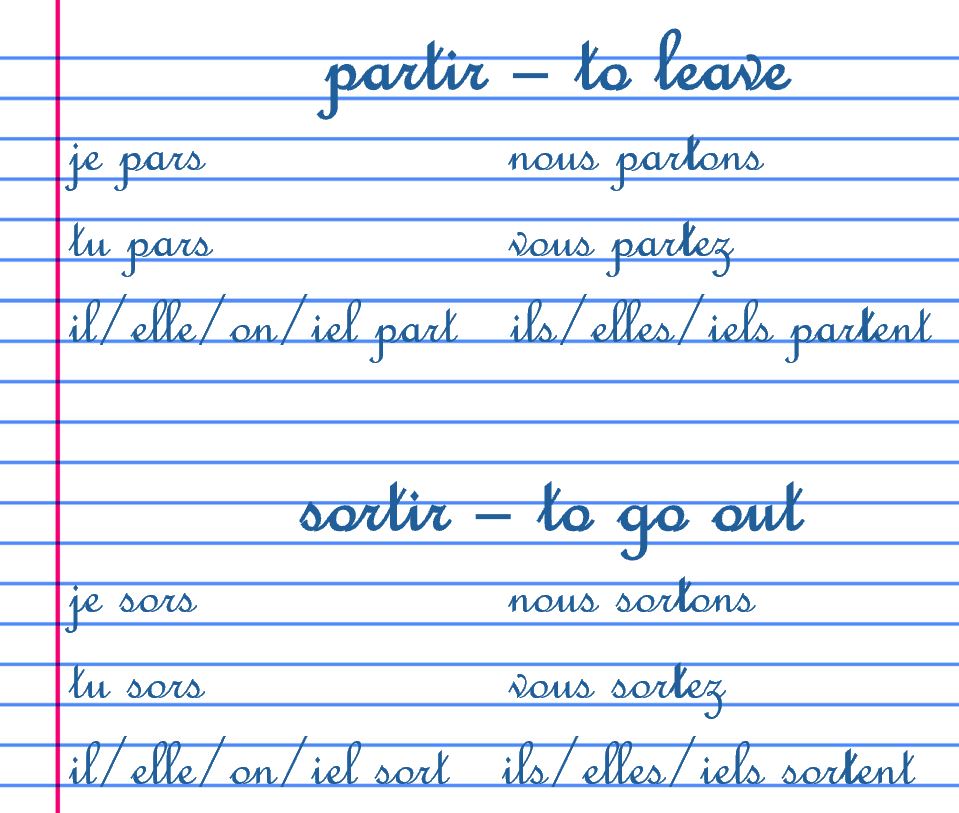
The French verb dormir comes from the Latin dormire (to sleep). Like sortir and partir, it’s an irregular verb that ends in -ir, but each follows a slightly different pattern. Interestingly, sortir and partir also come from Latin—sortiri (to draw lots or go out) and partire (to divide or depart). 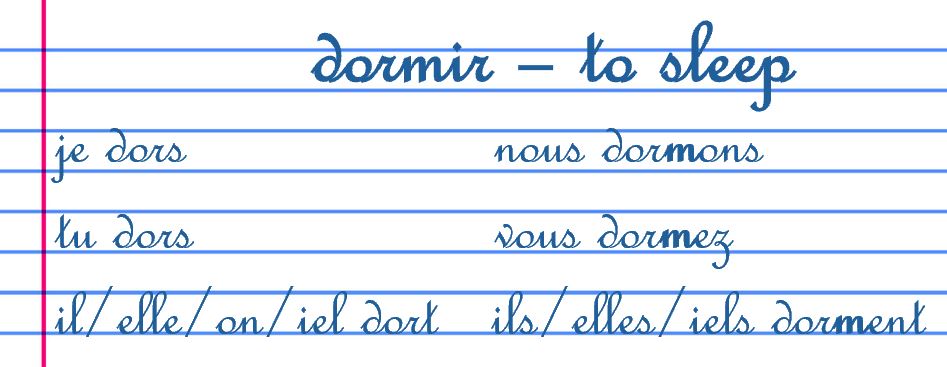
Practice
Regardez cette courte vidéo avec la conjugaison de partir, sortir et dormir.
Maintenant, est-ce singulier ou plurier ?
Écoutez chaque phrase et décidez si le verbe est au singulier ou au pluriel.
Modèle : Ils sortent souvent au cinéma. –> pluriel
Écoutez l’audio une deuxième fois et écrivez les phrases.
2. On apprend : La négation (suite)
In the previous chapter, you learned how to make basic negative sentences in French using ne…pas, which means “not.” For example, Je ne parle pas anglais (“I do not speak English”). You also learned in Chapter 2 that in everyday spoken French, people often drop the ne, saying just Je parle pas anglais. In this chapter, you’ll learn other common ways to express negation, such as ne…jamais (“never”), ne…plus (“no longer”), ne…rien (“nothing”), and ne…personne (“nobody”). These follow the same pattern as ne…pas, with ne before the verb and the second part after. In informal speech, ne is often dropped in these extended forms too—so you might hear Je mange jamais de viande instead of Je ne mange jamais de viande.
Here is a short visual summary of the negative expressions:
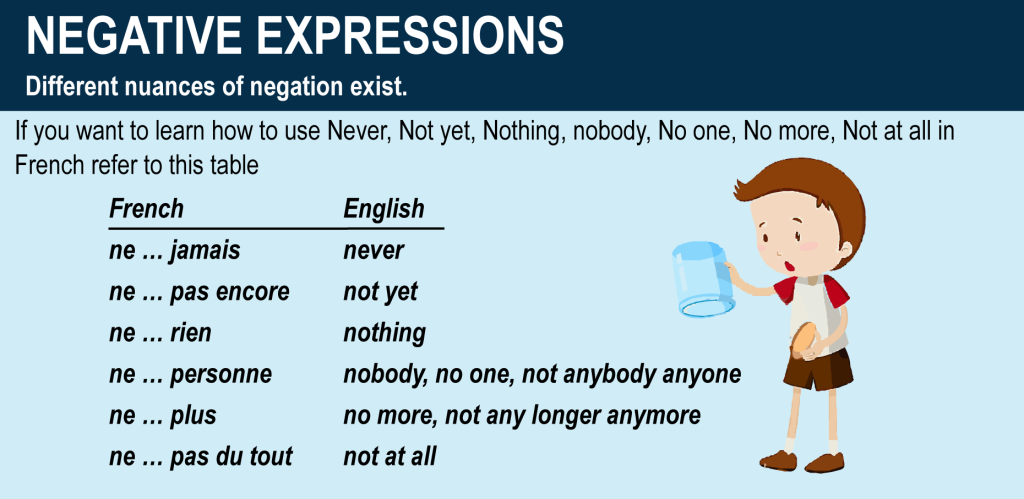
To learn more, go to #Grammaire #LaNégation+. Lisez les explications et complétez les activités Ne … jamais, rien, personne, etc.
3. Le Carnet personnel : Le / la colocataire agréable
Comment imaginez-vous un.e colocataire agréable et désagréable ?
Partie 1 : Lisez ces questions, copiez-les dans votre Carnet personnel et notez si c’est un.e colocataire agréable ou désagréable.
Modèle : Il/elle/iel ne dort jamais. ➡️ C’est un.e colocataire désagréable.
- Il/elle/iel part souvent le week-end.
- Il/elle/iel sort souvent.
- Il/elle/iel dort jusqu’à midi.
- Il/elle/iel ne fait jamais la cuisine (=cook).
- Il/elle/iel ne fait jamais la vaisselle (=dishes).
- Il/elle/iel fait du yoga devant (=in front of) la télé.
- Il/elle/iel ne sort pas son chien.
- Il/elle/iel ne fait rien.
- Il/elle/iel ne parle à personne.
Partie 2 : Écrivez deux ou trois phrases qui correspondent au / à la colocataire agréable et désagréable. Utilisez une variété de verbes (acheter, partager, manger, sortir, etc.). Révisez le vocabulaire du Chaptire 2 : Les passe-temps et activités et les verbes.
| Le/la colocataire agréable | Le/la colocataire désagréable |
| Il/elle/iel mange à la cantine (=cafeteria) avec moi.
Il/elle/iel … Il/elle/iel … Il/elle/iel … |
Il/elle/iel mange des chips sans (=without) moi.
Il/elle/iel … Il/elle/iel … Il/elle/iel … |
4. On lit et on écoute
Now you are going to read and listen a short authentic French text, entitled Les Vacances, published on the educational site Podcast Français Facile – https://www.podcastfrancaisfacile.com/. This site is designed by Vincent Durrenberger and Nicolas Chopin to help French learners improve their reading and listening skills. The text is written in the present tense and describes how many school holidays and breaks French students have throughout the year. It also talks about family traditions, popular activities like skiing, and summer jobs. It’s a great way to learn about French culture while practicing everyday vocabulary and verbs. Don’t be discouraged if you don’t understand every word. Focus on the words you do recognize and understand!
|
En France, l’année scolaire commence au début du mois de septembre. 0n appelle ce moment “la rentrée des classes“. Les premières vacances arrivent à la fin du mois d’octobre. Les élèves et leurs professeurs ont deux semaines de repos (=break).
Il y a ensuite les vacances de Noël. Noël est une fête très importante en Europe. La famille se réunit. On voit ses parents, ses frères, ses grands-parents, ses oncles et ses tantes, ses cousins et ses cousines, etc. Les repas durent très longtemps et on reçoit des cadeaux le 25 décembre. On a donc des vacances pour avoir le temps de se retrouver en famille. En tout, il y a près de deux semaines.
En hiver, il y a ce qu’on appelle “les vacances d’hiver“, ces vacances sont différentes des vacances de Noël. Elles se passent au mois de février pendant une semaine. Beaucoup de Français vont faire du ski ou du snowboard. Mais attention, les sports d’hiver coûtent très cher. Tout le monde ne peut pas partir.
Après les vacances d’hiver, il y a les vacances de printemps. C’est au mois de mars et ce sont les dernières vacances avant la fin de l’année scolaire. Les lycéens en classe de terminale (=senior year of high school) doivent étudier beaucoup pendant ces vacances parce qu’elles sont juste avant le bac (=national high school diploma and final exam in France).
Le moment le plus attendu de l’année, c’est bien sûr le moment des vacances d’été. On dit aussi “les grandes vacances” parce qu’elles durent longtemps (deux mois environ). Souvent on essaye de travailler un peu pendant les grandes vacances pour gagner un peu d’argent. Car en France, les lycéens et les étudiants n’ont généralement pas de petits boulots pendant l’année scolaire. |
How easy was it to understand this text? How many times did you listen to it?
 Remember what you learned in Chapter 1 about the importance of repetition in language learning. Repetition is key to success in any skill-building activity—whether it’s playing sports, learning music, or mastering a new language. The more you practice, the better you become, and the more automatic your skills will feel. So, listen to this text at least three times. You might be surprised by how much clearer it becomes with each repetition!
Remember what you learned in Chapter 1 about the importance of repetition in language learning. Repetition is key to success in any skill-building activity—whether it’s playing sports, learning music, or mastering a new language. The more you practice, the better you become, and the more automatic your skills will feel. So, listen to this text at least three times. You might be surprised by how much clearer it becomes with each repetition!
Comprehension Activity: Les Vacances scolaires en France
5. Le Carnet personnel : Quelles sont vos activités en vacances ?
Votre famille et les vacances.
Pensez à votre famille proche ou élargie. Comment passez-vous vos vacances ensemble ? Quelles sont les habitudes de chacun ?
Modèle : Qui préfère poster des photos sur Internet ? ➡️Mon père adore poster des photos sur Facebook.
- Qui préfère aller en boîte ?
- Qui visite des musées, expositions, etc. ?
- Qui emmène son animal domestique en vacances ?
- Qui nage dans la mer ?
- Qui préfère découvrir des restaurants locaux ?
- Qui préfère faire la grasse matinée (=sleep in) ?
- Qui achète beaucoup de souvenirs ?
- Qui fait du camping ?
- Qui essaie de parler une langue différente ?
Maintenant, écrivez un petit texte pour décrire les habitudes de vacances de votre famille.
Modèle :
Salut, je m’appelle Sophie et j’adore voyager pendant les vacances. Ma mère visite des musées et des expositions parce qu’elle aime l’art. Elle achète beaucoup de souvenirs ! Mon père préfère la nature – il adore faire du camping. Mon petit frère fait la grasse matinée, et moi aussi, j’aime dormir. Nous préférons découvrir des restaurants locaux, mais parfois, ce n’est pas facile. J’aime la pizza et mes parents aiment explorer de nouvelles cuisines.
![]() ♦
♦![]()
Week 9 Day 1
On va où ? On fait quoi ?
 ♦
♦
1. On apprend : le verbe aller
Now that you’ve learned partir (to leave) and sortir (to go out), it’s time to explore another essential verb: aller, which means to go. While all three verbs involve movement, they are used differently. Partir is used when someone leaves a place, often for a longer time or a trip (e.g., “Je pars en vacances“). Sortir is used for going out, usually for leisure or short outings (e.g., “Elle sort avec ses amis le weekend“). Aller, on the other hand, is the most general—it’s used to talk about going somewhere, whether it’s school, the store, or another country (e.g., “Nous allons à Paris“). Understanding these differences will help you describe your daily activities and travel plans more accurately.
To learn more about this verb, go to #Grammaire #ALLER Lisez les explications et complétez les activités : aller ‘to go’
Don’t foget to write down the conjugation of this essential verb in your Carnet personnel.
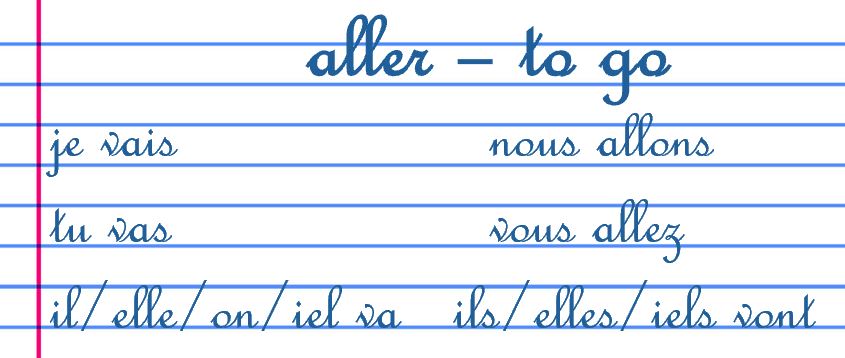
In French, être, avoir, and aller are the ultimate power trio 💪—you need them to build different tenses and they pop up in countless everyday expressions. These verbs are so important that you should be able to recite their conjugations even if someone wakes you up in the middle of the night! Think of them as your language-learning MVPs: the more you practice them, the smoother your French will sound.
Practice
Here is a video with the conjugation of aller from Learn French With Alexa | Welcome to Learn French With Alexa created by Alexa Polidoro, a French teacher with over 30 years of experience. Her website and its associated YouTube channel have a strong global following – over 2 million YouTube subscribers and more than 150 million views – Pas mal !, as they say in French!
See if you remember how to conjugate aller:
C’est bizarre ou c’est normal ?
Un peu de traduction?
Let’s put everything together – do you remember how to conjugate all these verbs?
2. Les prépositions : un petit mot, un grand rôle
In learning a foreign language, prepositions play an essential role. These tiny words fulfill an important function: They show relationships between words and give meaning to sentences. In French, as in other languages, prepositions vary depending on the verb. That’s why it’s very helpful to memorize verbs with their prepositions from the beginning. For example, we say penser à someone, but compter sur someone. These combinations are not always logical or the same as in your native language. Learning verbs with their prepositions will help you speak more naturally and avoid common mistakes.
This week, we will explore two of the most common French prepositions: à and de. We will take time to observe and analyze various examples in different contexts, because these prepositions can sometimes be used with the same verbs—but they can significantly change their meaning. That’s why it’s important to pay close attention to how they’re used. If you’re curious to learn more about their differences right away, there are many helpful websites online. One excellent resource is: ThoughtCo – When to Use À vs. De in French, which offers a clear overview with tables and plenty of examples.
Practice
Où est-ce qu’on va pour…? Can you match these places with the following activities?
Où est-ce que vous allez pour … Can you guess the correct preposition for each sentence based on the examples you’ve seen so far? The choices are – à la, à l’, au, en, and aux.
3. On observe et on analyse : les contractions avec la préposition à
When indicating movement to/toward a location, what rules have you observed so far?
In French, contractions occur when a preposition (like à or de) combines with a definite article (le, la, l’, les) to form a single word. These contractions are mandatory—you cannot separate the preposition and article.
✅ Examples:
- à + le → au
Je vais au parc. Tu vas souvent au cinéma. - à + les → aux
Elle parle aux enfants. (She’s talking to the children.) Nous allons aux fêtes organisées par l’université.
Note: There is no contraction with la or l’:
- Je vais à la piscine le lundi.
- Max ne va pas à l’ école le samedi.
🕰️ A Bit of History: What is en?
The preposition en comes from Latin in, meaning “in” or “into.” Over time, it evolved in French to express:
- location: en ville (in town), en forêt (in the forest)
- transportation: en voiture (by car), en train (by train)
- feminine countries: en France, en Italie
Unlike à and de, en does not contract with articles—it stands alone.
Practice
Based on what you have just read, which form of à would you use with each of these destinations?
How did you do?
Did you guess correctly that we say On va à Montréal and On va en Iran—but you’re not quite sure why? Isn’t it fun (and sometimes frustrating!) when languages have rules… and exceptions to those rules?
What do the bolded prepositions in the sentences below mean in your language?
|
On va à Montréal. On va au Vietnam. On va en France. On va aux États-Unis. |
à = au = en = aux = |
In English, all od them would translate as simply to. Do you remember the gender of the nouns that refer to these countries –Vietnam and France? As a general rule, countries that end in -e are feminine in French, except for le Mexique, le Mozambique, and le Cambodge. No rule is absolute, of course 😉.
Now fill in the blanks below. To express going to a particular destination, one would use the following prepositions:
To learn more about these rules, go to #Grammaire #PrepositionsPlaces. Lisez les explications et complétez les activités : prepositions with places
4. Le Carnet personnel : Activités et lieux de vos vacances préférées
In your Carnet personnel, write about what you enjoy doing during your vacations and where you like to do these activities. This three-part writing activity is designed to help you reflect on your preferences, practice using vocabulary and grammar structures, and build complete sentences. Each part will guide you through expressing your favorite places and activities, using negation to say what you never do, and finally creating a short personal paragraph that brings everything together—just like in the final model.
Partie 1 : T’es plutôt (=are you rather) plage, montagne, ville ou relax à la maison ? Où est-ce que vous préférez faire les activités suivantes : à la plage, à la montagne, en ville, à la maison ?
Modèle :
Je préfère faire du yoga à la maison ou à la plage, mais aussi parfois à la montagne — cela peut être sympa.
- faire du yoga
- faire du ski
- visiter un musée
- faire du paddle
- aller au concert
-
faire une randonnée
- chiller* devant une série
- votre activité préférée
* familier
Partie 2 : Qu’est-ce que vous NE faites JAMAIS en vacances ?
Avant de commencer cette partie, révisez : #Grammaire #Négation Lisez les explications et complétez les activités : basic negation: ne … pas & ne … jamais, rien, personne, etc.
Révisez aussi le vocabulaire du chapitre – #OnYGo Les activités – les expressions avec faire et aller Flashcards | Quizlet
Modèle :
Je ne fais jamais de parachute (=skydiving).
Partie 3 : Qu’est-ce que vous aimez faire ou ne pas faire en vacances ? Écrivez 5+phrases pour décrire vos activités. Variez vos expressions. Pensez aux saisons différentes. Vous pouvez aussi décrire les préférences de vos amis ou de vos proches.
Modèle:
En vacances, je suis plutôt plage. J’aime aller à la plage tous les jours en été – j’adore nager et j’aime bien bronzer. En automne ou au printemps, je fais souvent des randonnées à côté d’une rivière — j’aime regarder l’eau ! En hiver, je suis plutôt ville ou relax à la maison : j’aime visiter des musées, surtout les musées d’art, mais aussi chiller devant une série dans ma chambre. Je ne fais jamais de parachute. Je ne fais pas de plongée sous-marine (=scuba diving) non plus. Ma meilleure amie, Lola, est plutôt montagne parce qu’elle adore faire du ski en hiver et elle fait des randonnées en été. Elle ne fait jamais de voile, elle n’aime pas la mer.
5. Les Colonies de vacances
A colonie de vacances (or une colo in spoken French) is a type of organized vacation camp for children and teenagers in France, typically held during school holidays. These camps offer a mix of outdoor activities, sports, cultural outings, and social experiences in a supervised setting. They can take place in the countryside, mountains, or by the sea.
The concept dates back to the late 19th century, originally created to give children from urban or working-class families a chance to enjoy fresh air and nature. After World War II, colonies became more widespread and were supported by the French government as part of social and educational policy. They were seen as a way to promote equality, health, and citizenship. Today, colonies de vacances or colos remain popular, though more diverse in format—some focus on language learning, arts, or specific sports. They are considered a cherished part of French childhood and a cultural tradition that blends fun with personal growth.
In this short video, created by Loisirs Provence Méditerranée to promote one of their summer camps for teens, you’ll get a glimpse into what it’s like to spend time in a colonie de vacances—a popular French tradition where kids and teens enjoy outdoor activities, make new friends, and gain independence. Watch how the camp is organized, what kinds of activities are offered, and how young people experience life away from home in a fun and supportive environment.
Would you have enjoyed spending one of your summers at a similar summer camp?
 ♦
♦
Week 9 Day 2
Vacances, études et origines
 ♦
♦
1. On lit
♦♦ Variations sociales : les congés payés (=paid leave) dans le monde francophone
In most countries, including all industrialized nations except the United States, advances in labor laws have seen the establishment of an annual entitlement to paid vacation and public holidays for full-time workers. The details differ by country: some companies may offer their employees more time than the national minimum, some do not count public holidays when figuring this number, some take into account the length of time the employee has worked in service to their employer and some take into account the employees’ age. Most countries also offer paid leave benefits, such as parental leave and sick leave, which are in addition to the annual paid leave mentioned here.
Check out the table below of annual paid leave in various corners of the francophone world and compare the numbers:
|
Pays |
Paid vacation days |
Paid public holidays |
Total paid leave In days |
|
Belgique |
20 |
10 |
30 |
|
Bénin |
24 |
13 |
37 |
|
Burkina Faso |
30 |
15 |
45 |
|
Burundi |
17 |
13 |
30 |
|
Canada |
10-20* |
6-10 |
16-30 |
|
Chad |
24 |
3 |
27 |
|
Côte d’Ivoire |
20 |
14 |
34 |
|
Djibouti |
25 |
10 |
35 |
|
France |
25-37 |
11 |
36-48 |
|
Haiti |
11* |
16 |
27 |
|
Luxembourg |
26-36 |
11 |
37-47 |
|
Madagascar |
22 |
13 |
35 |
|
Niger |
22 |
12 |
34 |
|
Rwanda |
15 |
11 |
26 |
|
Sénégal |
20 |
12 |
32 |
|
Switzerland |
20 |
7 |
27 |
|
Togo |
22 |
0 |
22 |
|
United States |
0 |
0 |
0 |
*relative to service length of employees
Source: List of minimum annual leave by country – Wikipedia
a. What trends do you observe? Does any information surprise you? Which details?
b. Why do you think paid annual leave is such a common trend in society? What are its potential benefits?
2. On révise : Où est-ce que l’on va pour visiter, étudier ou se relaxer ?
En français, l’usage des articles et des prépositions avec les noms de lieux dépend principalement du genre grammatical (masculin, féminin, pluriel) et du type de lieu (ville, pays, province, état). Les villes sont généralement utilisées sans article et avec la préposition à : Ils vont à Paris. En revanche, les pays, provinces, et états prennent un article défini et une préposition qui varie selon le genre :
- en pour les noms féminins (en France),
- au pour les noms masculins (au Canada),
- aux pour les noms pluriels (aux États-Unis),
- en pour les noms masculins qui commencent par une voyelle pour faciliter la prononciation (en Iran).
Ces règles s’appliquent également aux provinces canadiennes (en Alberta, au Québec), aux régions françaises (en Bretagne, au Pays de la Loire), et aux états américains (en Californie, au Texas).
Une note importante – Pour les États américains très connus comme le Texas ou la Californie, on dit souvent “au Texas” ou “en Californie”, mais pour les États moins connus ou moins fréquemment mentionnés en français, comme le Wisconsin, l’Indiana ou le Michigan, on utilise plutôt “dans le Wisconsin“, car cela souligne leur statut d’un lieu géographique. Pour plus d’information, consultez Geographical Prepositions | FrenchLearner Grammar Lessons ou États américains : emploi des prépositions EN, À et DANS | BDL.
Practice
Encore un peu de géographie ! Voici des villes et des pays qu’on peut visister si one veut découvrir ces pays.
Et les étudiants, ils vont où pour étudier ? Voici des villes, des provinces, ou des pays où les étudiants vont pour améliorer leur français. Donnez la préposition correcte pour chaque ville ou province.
Modèle: Bénin : Ils vont auBénin.
Les vacances aux Etas-Unis? Voià une petite conversation entre deux étdiants américains qui parlent de leurs vacances.
3. On analyse : iels / ils / elles sont d’où ?
Observez les phrases suivantes :
- Le Prince William est de Londres.
- Willie Nelson est d’Austin.
- François Macron est de France.
- Heidi Klum est d’Allemagne.
- Alireza Firouzja est d’Iran.
- Salma Hayek est du Mexique.
- Michelle Obama est des États-Unis.
What do the prepositions in bleu in the sentences above mean? You are right! It all means “from.”
To express provenance from a particular destination, the preposition “de” and its contractions with definite articles (du and des) are used in the following scenarios:
- The preposition de is used before nouns referring to feminine singular places or cities.
- The preposition du is used before masculine singular nouns referring to countries, regions, or states.
- The preposition des is used before plural nouns referring to countries, regions, or states.
- De becomes d’ in front of a vowel sound.
Practice
D’où sont les personnes / les objets suivants ?
Trouvez les lieux correspondants :
Écrivez les prépositions qui manquent :
4. On analyse : qu’est-ce qu’on va faire le week-end prochain ?
Maintenant vous savez (=know) comment parler de l’origine et des destinations avec être de et aller à. Allons un peu plus loin : apprenons (=let’s learn) à parler de ce qu’on va faire bientôt ! Le futur proche est une façon simple et très utile pour parler de l’avenir (=future) ! Imaginez ce que votre prof va faire le weekend prochain ? Lisez les affirmations suivantes sur votre prof et répondez par oui, non ou peut-être.
Le week-end prochain (=next weekend)…..
- Notre professeur de français va aller au Liban. → ☐ Oui ☐ Non ☑ Peut-être
- Notre professeur ne va pas travailler.
- Notre professeur va regarder une série.
- Notre professeur va danser en boîte.
- Notre professeur va écouter un podcast en français.
Maintenant, observez les phrases suivantes :
- Votre professeur ne va pas aller au Liban.
- Votre professeur va au café tous les jours.
- Votre professeur va à la bibliothèque le lundi.
- Votre professeur ne va pas travailler le week-end prochain.
Do they refer to past, present or future situations? What is the form of the verbs aller and travailler? Are the verbs conjugated or not?
To express the future in French, you can use the conjugated form of the verb aller followed by an infinitive. Negation is placed around the conjugated verb aller.
Practice
Following this rule, can you translate these sentences in French?
Écoutez et décidez si les phrases sont au présent (tous les jours) ou au futur proche (le week-end prochain).
Écoutez l’audio une deuxième fois et écrivez les phrases.
Voilà le week-end de Minh. Écoutez le texte lu par le professeur. Complétez les phrases suivantes :
To learn more about this future tense in French, go to #Grammaire #FuturProche. Lisez les explications et complétez les activités : futur proche
5. Le Carnet personnel : Votre week-end prochain
Partie 1 : Pratique orale
Lisez les questions suivantes à haute voix. Vous pouvez poser ces questions à vos camarades de classe sur leur week-end. Lisez les questions plusieurs fois pour pratiquer la prononciation pour pouvoir les poser en classe.
- Est-ce que tu vas rencontrer des amis vendredi soir ? Qui ?
- Est-ce que tu vas sortir au restaurant ? Avec qui ?
- Est-ce que tu vas rentrer tard (=late) samedi soir ? À quelle heure ?
- Est-ce que tu vas regarder un film ou une série ? Lequel / laquelle (=which one) ?
- Est-ce que tu vas acheter un bubble tea ? Quel parfum (=flavor) ?
- Est-ce que tu vas faire une promenade ? Où ?
- Est-ce que tu vas aller à un concert ? De quel artiste (=which) ?
- Est-ce que tu vas faire du sport ? Quel sport ?
Partie 2 : Réponses personnelles
Dans votre Carnet personnel, répondez à chaque question comme si un camarade vous les avait posées. Utilisez le futur proche.
Modèle :
Oui, je vais rencontrer mes amis vendredi soir. Je vais voir Clara et Hugo.
Partie 3 : Production écrite
Rédigez un paragraphe de six phrases pour décrire (=describe) votre week-end prochain. Essayez de varier (=vary) les verbes, les activités et le vocabulaire. Utilisez le futur proche.
Modèle :
Ce week-end, je vais aller au cinéma avec mes amis. Nous allons regarder un film d’action. Samedi matin, je vais faire du sport au parc. Ensuite, je vais acheter un bubble tea à la vanille. Le soir, je vais rentrer tard car je vais dîner chez ma cousine. Dimanche, je vais faire une promenade au bord du lac.
6. La Chaîne Météo
Before heading out for a weekend or vacation, most people check the weather forecast. In fact, studies show that the majority of travelers consult weather reports before packing their bags. What about you? Do you check the weather before making plans? Let’s now explore La Chaîne Météo – the French TV channel dedicated to weather forecasts 24/7. It’s similar to the American Weather Channel and offers forecasts, videos, and expert commentary.
Météo France : La meilleure info météo GRATUITE à 15 jours – La Chaîne Météo
You can search your city and find “La météo du jour.” For instance, here are the weather conditions in Stevens Point, WI on 8/7/2025:
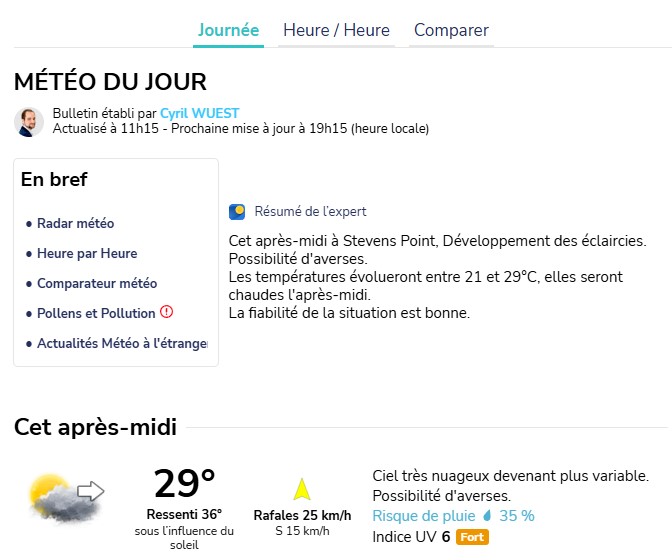
Can you guess most of the words here? What do you think this means – “29° Ressenti 36° sous l’influence du soleil”? You are right ! “29°C, feels like 36°C due to the sun.” But do you know what 36°C in Fahrenheit? To convert 36°C into Fahrenheit, you can use the formula:
Or you can use this Temperature Converter site.
![]() ♦
♦![]()
Week 9 Day 3
On s’ouvre au monde francophone : la Martinique
 ♦
♦
1. On lit
♦♦ Variations sociales : le créole antillais
Antillean Creole is a Caribbean French-based creole language of about 1 million speakers that includes the French Antilles (Guadeloupe, Martinique), Dominica, Grenada, Saint Lucia, Trinidad and Tobago.
Lesser Antillean Creole originated as a pidgin (i.e., a grammatically simplified means of communication that develops between two or more groups of people that do not have a language in common) in 1635 in Guadeloupe and Martinique, spoken by French settlers, enslaved Africans, and Aboriginal peoples. It evolved into a creole language by 1700, due to an increase in influence from West African languages, Amerindian languages, Spanish, and English.
Some of Antillean Creole’s unique linguistic features include:
- the use of ne…point as the negation (instead of ne…pas)
- possessive adjectives being placed after the noun, i.e. kay mwen ‘house my’ = ‘my house’
- the use of the same grammatical forms for adverbs as for adjectives, e.g. elle est gentille ‘she is nice’ (adj.) vs. elle parle gentille ‘she talks nice’ (adv.) (vs. gentiment ‘nicely’).
Antillean Creole emerged as a means of communication among enslaved people of different ethnic origins in a context of plantation slavery in the French Antilles. Creole in these spaces has gone from being viewed as a sign of lower socioeconomic status to a mark of national pride, with an ongoing literary revival in Guadeloupe and Martinique that started in the 1970s.
Check out this list of Antillean Creole expressions and then match them to their Hexagonal French equivalents below! Hint: Read them out loud for an idea of how they sound!
- Yé ka aplé _____ a. J’ai faim
- Jodi _____ b. Pardon
- Mwen fin _____ c. Bonne journée
- Lo _____ d. Je m’appelle
- Eskizé mwen _____ e. Eau
- Bon zourné _____ f. Aujourd’hui
Feeling brave? Using the glosses below, try to figure out what this street sign in Guadeloupe is saying:
Read this for help: Le vocabulaire à connaître pour un voyage aux Antilles
Want to learn more about Antillean Creole? Check out these resources:
Guadeloupean Creole alphabet, pronunciation and language
📆 LIVRE ENFANT en CREOLE – Dictionnaire CREOLE – Les Jours, Mois, Saisons en Créole Martiniquais
🇫🇷 Français de France vs Créole de Martinique 🇲🇶 @frenchclassnyc #… | TikTok
2. Le Carnet personnel : On découvre la Martinique
Département et région d’outre-mer (DROM)La capitale : Paris / ville principale : Fort-de-France Les langues parlées: le français, le créole La cuisine typique : le féroce, le ti nain morue, les accras, le trempage La fête nationale : le 14 juillet (comme en France) |
|
Pour découvrir la Martinique cliquez sur le lien suivant : https://www.martinique.org/ et allez sur le site.
Dans votre Carnet personel, notez vos observations et les résultats de vos recherches sur Internet.
I. Go to this page, https://www.martinique.org/experience/comment-venir-en-martinique and answer the following questions:
- Where is La Martinique?
- Which ocean and sea surround this island ?
II. Associez les activités suivantes avec les régions en Martinique (https://www.martinique.org/experiences-inoubliables) :
- Les activités nautiques
- Les activités vertes
- Les activités aérienne
- Les activités patrimoniales
avec :
1. Faire de la plongée sous marine
2. Faire du parapente
3. Visiter le zoo
4. Faire des promenades dans la forêt tropicale.
5. Faire des randonnées sur la montagne Pelée.
6. Visiter le musée de la banane
7. faire des activités balnéaires : jet ski, paddle, kite surf.
8. Faire du kayak
III. Go to Culture et Patrimoine de la Martinique | Héritage et tradition martiniquaise and answer the following questions:
- How would you translate the concept of “Patrimoine”?
- Can you explain the title: “La Martinique, île métissée”?
- Choose one topic presented on the page that interests you and do some research to find more about it. Then write down your findings so you can present them to your classmates in class.
- Now think about the “patrimoine” of your city, state or country, what would be three topics that you would like to highlight and save three pictures on your phone to illustrate your choices during future class discussions.
3. Spotlight sur Aimé Césaire

Aimé Césaire (1913–2008) was a poet, playwright, and politician from Martinique.He is best known for helping to create the Négritude movement, which celebrated Black identity, African heritage, and resistance to colonialism. While studying in Paris, Césaire met other Black intellectuals like Léopold Sédar Senghor and Léon Damas, and together they founded a magazine called L’Étudiant Noir (“The Black Student”). This was the beginning of Négritude—a powerful literary and political movement that gave voice to colonized peoples. Césaire’s most famous poem, Cahier d’un retour au pays natal (“Notebook of a Return to the Native Land”), expresses pride in his roots and anger at colonial oppression. He also wrote plays, including Une Tempête, a Caribbean version of Shakespeare’s The Tempest, where the enslaved character Caliban becomes a symbol of resistance. In politics, Césaire served as mayor of Fort-de-France for decades and was a member of the French National Assembly. He was deeply committed to anti-colonial causes and believed in the power of words to inspire change. To learn more, explore some of the sites dedicated to this remarquable man and his work: 1) Aimé Césaire – Wikipedia, 2) Assemblée nationale : Aimé Césaire, 3) Aimé Fernand Césaire | The Poetry Foundation, 4) Négritude (Stanford Encyclopedia of Philosophy), or 5) Aimé Césaire | Surrealist Poet, Negritude Movement & French Caribbean | Britannica |
Now that you’ve learned a bit about Aimé Césaire and his role in celebrating Caribbean identity and resisting colonialism, let’s explore one of his poems: “Eau et soleil” (Water and Sun), published in 1946 as part of his poetry collection Les Armes miraculeuses. This poem reflects Césaire’s deep connection to nature and his poetic style, which blends vivid imagery with powerful emotion. As you read, pay attention to how he uses elements like water and sunlight to express beauty, strength, and renewal—key themes in his work and in the Négritude movement.
4. On analyse le poème : “Eau et soleil”
Step 1. Reflecting
Have you ever read or studied poetry before? Reflect on your experiences and understanding of poetry.
Step 2. Reading
Soleil et Eau Mon eau n’écoute pas mon eau chante comme un secret Mon eau ne chante pas mon eau exulte comme un secret Mon eau travaille et à travers tout roseau exulte jusqu’au lait du rire Mon eau est un petit enfant mon eau est un sourd mon eau est un géant qui te tient sur la poitrine un lion ô vin vaste immense par le basilic de ton regard complice et somptueux Par Aimé Césaire Cadastre suivi de Moi Laminaire…, Aimé Césaire, coll. Points Poésie, © Éditions du Seuil, 2006 |
Read the poem out loud and underline or highlight any words or phrases that stand out to you.
Here are two different readigns of the poem:
After reading the poem aloud yourself and listening to it, reflect on your initial interpretations of the poem. Write down your thoughts, emotions, and any questions or uncertainties you have in your Carnet personnel
Step 3: Reflection
- What words or phrases stand out in terms of their meaning, sound, or rhythm?
- Are there any literary devices or figures of speech used in the poem?
- Are there any images or visual representations that come to mind when reading the poem? How does the poem evoke visual imagery?
- Are there any sounds or rhythms in the poem? How does the poem sound when read aloud?
- How does the poem create a sense of space or location? Does it evoke a particular setting or atmosphere?
- How does the poem reflect the cultural background, experiences, or perspectives of Aimé Césaire or the larger cultural context?
Step 4. Creation
Create your own artistic response to the poem. You can choose to write a poem, create a visual artwork, compose a song, or any other form of creative expression that captures your interpretation of the poem. Here are some resources that can help and inspire you : French Poetry Translation Workshop: Soleil et Eau – Stephen Spender Trust & Wall Mural – Soleil et Eau in La Seyne-sur-Mer (France)
5. #GoMartinique
Regardez les photos ci-dessous et identifiez les thèmes ? Quelle est l’audience ? Qu’est-ce que vous pensez de cette représentation de la Martinique ? Expliquez en français ou dans votre langue. Notez vos idées dans votre Carnet personnel
Avec vos camarades de classe ou tout.e seul.e, décidez d’une audience et ensuite faites un montage de photos pour représenter votre pays, états, région, ville, etc. et décidez du hashtag que vous utiliserez.
6. On prononce #VoiceTyping (Optionnel)
Imagine that you are presenting a weather forecast on your YouTube channel. Read the following forecast in French and use VoiceTyping on Google to transcribe it. Then examine the text it produces and answer the questions below in your Carnet personnel
Les prévisions météo :
Aujourd’hui, il va pleuvoir un peu et il fera beau, 24 degrés Celsius. Le vent du sud-est va souffler assez fort.
Demain, le soleil va briller et il fera très chaud, 31 degrés Celsius. Le vent du sud-est va souffler un peu plus fort.
Vendredi, il va pleuvoir un peu et il fera chaud, 28 degrés Celsius. Le vent du sud-est va souffler assez fort.
N’oubliez pas de porter des vêtements légers et d’apporter un parapluie si vous sortez aujourd’hui.
Demain, allez à la plage, mais protégez-vous du soleil. Restez au sec pendant la pluie prévue pour mercredi et vendredi.
In your Carnet personnel 
- Examine the text output by VoiceTyping. Does it match with what you said? How is it different? Make a list below of at least 3 differences.
- What I said ….
- What VoiceTyping understood …
- Now compare the VoiceTyping output with the original text. Can you offer an explanation as to why it misunderstood certain parts of what you were saying?
- Now look more globally at the errors VoiceTyping made in transcribing your French all throughout the weather forecast. Are there any patterns to be noticed? i.e. does it always misunderstand certain sounds or words? Why do you think that might be?
- What have you learned about text-to-speech software from this activity?
 ♦
♦
Week 10 Day 1
Révisions en rythme !
 ♦
♦
On s’éclate en musique !
1. On découvre : À genoux par Meryl, feat. Kalipsxau
The song “À genoux” by Meryl featuring Kalipsxau was officially released on January 10, 2025. Meryl is a rising star from Martinique, known for her powerful voice and ability to blend rap, pop, and Caribbean rhythms. She often sings in both French and Creole, reflecting the rich linguistic and cultural diversity of the island. Her music explores themes like identity, emotion, and resilience. Kalipsxau, also from Martinique, is a newer artist who collaborated with Meryl on this song. Together, they bring a modern sound that mixes urban music (like rap and R&B) with traditional Caribbean influences. This fusion is part of a broader movement in contemporary Caribbean music, where artists combine global genres with local styles. One traditional genre from Martinique is le zouk—a danceable, rhythmic music style that emerged in the 1980s and was popularized by the group Kassav’. Zouk is known for its smooth melodies and strong beats, and its influence can still be felt in today’s music.
“À genoux” is a song about emotional vulnerability and love. It’s a great example of how young Caribbean artists express deep feelings through modern music while staying connected to their roots.
Regardez le clip de la chanson et lisez les paroles de la chanson Paroles À Genoux par Meryl – Paroles.net (lyrics).
Cette chanson a des paroles en français et en créole antillais. Voici la traduction du créole en français et en anglais :
| Créole | Français | English |
| Mé kité yo palé kon yo lé Kité yo palé san yo sav I ni an jou, an ké mandé’w mayé Dlo ké koulé an zyé papa’w Mé kité yo palé kon yo lé Kité yo palé san yo sav |
Mais laisse-les parler comme ils veulent Laisse-les parler sans savoir Un jour, je te demanderai en mariage Des larmes couleront des yeux de ton père Mais laisse-les parler comme ils veulent Laisse-les parler sans savoir |
But let them talk as they wish Let them speak without knowing One day, I will ask you to marry me Tears will fall from your father’s eyes But let them talk as they wish Let them speak without knowing |
Observez bien les trois langues : est-ce que vous voyez des différences dans la longueur des phrases ? Est-ce que certains mots se ressemblent ou sont très différents ? Regardez aussi la grammaire : comment les verbes sont placés, comment on utilise les pronoms, etc. Quelles sont les différences les plus intéressantes selon vous ?
Practice
Time to review what you have learned in this chapter! Do you remember how to conjugate partir, sortir, dormir, and aller in the present tense? How does one form le futur proche in French? Do you remember the usage of the preposition à and its contractions (au, aux), what about en and destinations? Finally, do you recall how to say someone is from a place and which forms of de should be used with different places?
2. On découvre : Bienvenue chez moi par Bigflo & Oli
Time to take another musical break!
Bigflo & Oli are two brothers from Toulouse, France—Florian (“Bigflo”) and Olivio (“Oli”) Ordoñez. They started making music together as teenagers and quickly became one of France’s most popular rap duos. Their style is known for being thoughtful, poetic, and socially aware, often telling stories or sharing personal experiences. In “Bienvenue chez moi ” AKA “Welcome to My Home,” Bigflo & Oli take listeners on a musical tour of France, describing different cities, regions, and their unique cultures, foods, and people. It’s a celebration of diversity, pride, and hospitality across the country.
Practice
Regardez le clip de la chanson et ensuite répondez aux questions de ce quiz:
Tu as bien réussi le quiz ?
Vous pouvez lire les paroles en français (Paroles) ou même en anglais (Translation)).
3. On fait du volontariat à l’étranger (optionnel)
Est-ce que vous faites du volontariat ? Est-ce que cela vous intéresse ? Est-ce que vous avez entendu parler de ‘Woofing’ ?
Explorez le site WWOOF et choisissez une destination dans un pays francophone de votre choix. Ensuite, planifiez un séjour de 3 mois dans une ferme biologique.
- Destination sélectionnée :
- Date sélectionnée :
- Cherchez un billet d’avion sur un site comme www.kayak.com. Combien va coûter un billet d’avion :
- Ferme sélectionnée :
- Travail :
- Écrivez un e-mail à votre futur hôte. Présentez-vous (5 phrases minimum) et donnez les détails de votre voyage (dates, compagnie d’aviation, heure d’arrivée etc…).
On finit sur une bonne note !
You made it through chapter 3, now take a moment to assess your progress. Read each objectives, try to perform the task and then check if you are able to do it. After finishing this chapter, I can:
☐ talk about geography
☐ count up to 100 000 000
☐ navigate traveling websites and book a trip online
☐ talk about the weather
☐ discuss which season you prefer and why
☐ learn and use Arabic words commonly used in French
☐ learn and use the verb to do /faire
☐ talk about where you like to go and what you like to do on vacation
☐ tell someone what types of activities one can enjoy in different types of weather
☐ learn and use -IR verbs
☐ learn and use various ways to negate sentences (ne…jamais, ne…plus, …)
☐ learn about French school holidays and breaks
☐ tell someone about your favorite pastimes and activities
☐ learn and use the verb to go /aller
☐ learn and use prepositions with places
☐ learn about paid leave in the Francophone world
☐ tell someone what types of activities one can enjoy in various places
☐ express provenance from a particular destination
☐ tell someone what you generally do on the week-ends
☐ learn and use how to speak about the future / le futur proche
☐ tell someone what you are going to do next week-end
☐ talk about Antillean Creole, Martinique, and Aimé Césaire
You can also complete this activity electronically and see how you do:
Level up !
- In which areas of this chapter do you feel confident in your abilities?
- In which areas do you feel less confident in your abilities?
- Look back at the areas you felt less confident about in Chapter 2. Do you feel more confident in those areas now or about the same?
Media Attributions
- line
- image8-2
- image6-1
- image10-1
- image25
- image11-1
- image3-1
- Carnet-personnel
- 92329-text-photography-yellow-brain-light-stock
- 9552380[1]
- Faire-conj
- Partir-sortir-conj
- Dormir-conj
- blog-pic-2-2
- Aller-conj
- Lameteo-SP
- gettyimages-AimeCesaire





